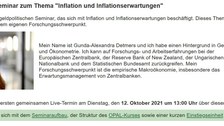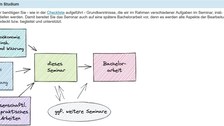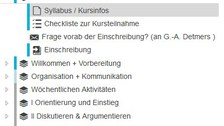Bachelorseminar "Aktuelle Fragestellungen der Geldpolitik / Inflation & Inflationserwartungen": Dr. Gunda-Alexandra Detmers (#GD1)
Kurzbeschreibung
Das Bachelorseminar verknüpfte aktuelle Fragestellungen der Geldpolitik mit wissenschaftlichem Arbeiten. Der inhaltliche Fokus war auf ein aktuelles und relevantes Thema gerichtet, welchem sich die Studierenden in Gruppen- und Einzelarbeiten über vielfältige methodische Zugänge genähert haben. Die einzelnen Lernaktivitäten bildeten dabei den Prozess des wissenschaftlichen Arbeitens ab.
Schlagworte
- Virtuelle Kollaboration
- Flipped Classroom
- Gruppenaustausch und peer-Feedback
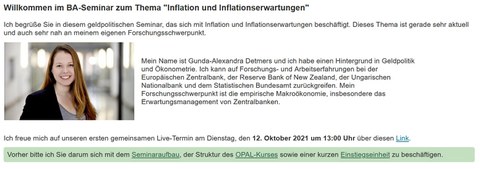
© Gunda-Alexandra Detmers
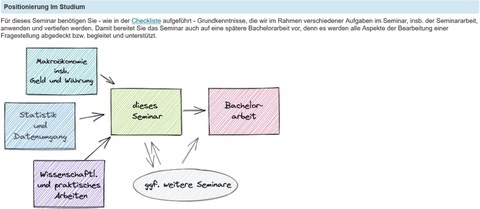
© Gunda-Alexandra Detmers
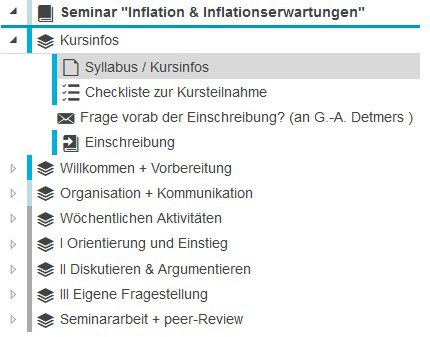
© Gunda-Alexandra Detmers
Was macht das Schmuckstück besonders?
Von Studierenden wird erwartet, dass sie im Rahmen von Seminaren und Abschlussarbeiten wissenschaftlich arbeiten; leider gibt es im Curriculum oft nur wenig Gelegenheit dies einzuüben. Ich habe daher vielfältige digital gestützte Methoden in meinen Kurs eingebaut, um den Studierenden einen Leitfaden an die Hand zu geben und die nachhaltige Aneignung zu fördern. Die gegenseitige Unterstützung in Form von Austausch und peer-Feedback spielte eine weitere Kernrolle, um sich so auch der eigenen Kompetenzen untereinander bewusst zu werden. Die Lehrveranstaltung zeichnete sich insbesondere durch folgende Methoden und Aspekte aus:
- Die Lernaktivitäten umfassten Diskussionen zu aktuellen Themen, Kurzpräsentationen sowie kontinuierliche Schreibaufgaben und bildeten damit verschiedene Schritte des wissenschaftlichen Arbeitens ab.
- Begleitende Arbeitsblätter führten die Studierenden Schritt für Schritt zu ihrer Seminararbeit. So konnten sie den Prozess des wissenschaftlichen Arbeitens über das Semester hinweg erleben und erlernen. Da die Aufgaben themenunspezifisch formuliert sind, kann das Arbeitsbuch von den Studierenden auch für zukünftige Arbeiten herangezogen werden.
- Durch das digitale Format war es möglich, Tools zum kollaborativen Arbeiten effektiv und effizient zu nutzen.
- Das Prinzip des Flipped Classrooms erlaubte eine hohe Interaktion mit Fokus auf Diskussion und Austausch in den virtuellen Liveveranstaltungen.
- Digital gestütztes und begleitetes peer-Feedback versorgte die Studierenden mit kontinuierlichen Rückmeldungen und der Ergebnisbetrachtung durch die Leserperspektive.
Die Teilnehmenden zeigten bis zuletzt eine hohe Aktivität im Kurs. Das stetige Engagement der Studierenden ermöglichte zudem einen entsprechenden Fortschritt der Gruppe. Schließlich lassen insbesondere die finalen Seminararbeiten eine tiefe inhaltliche Auseinandersetzung mit den Themen in Verbindung mit einem wissenschaftlich fundierten Vorgehen sowie eine hohe Textqualität erkennen.
Kontaktperson
Organisationseinheit
Fakultät Wirtschaftswissenschaften, Professur für VWL, insb. International Monetary Economics
Größe der Lehrveranstaltung
bis zu 30 Studierende
Abstimmungskennung
#GD1

